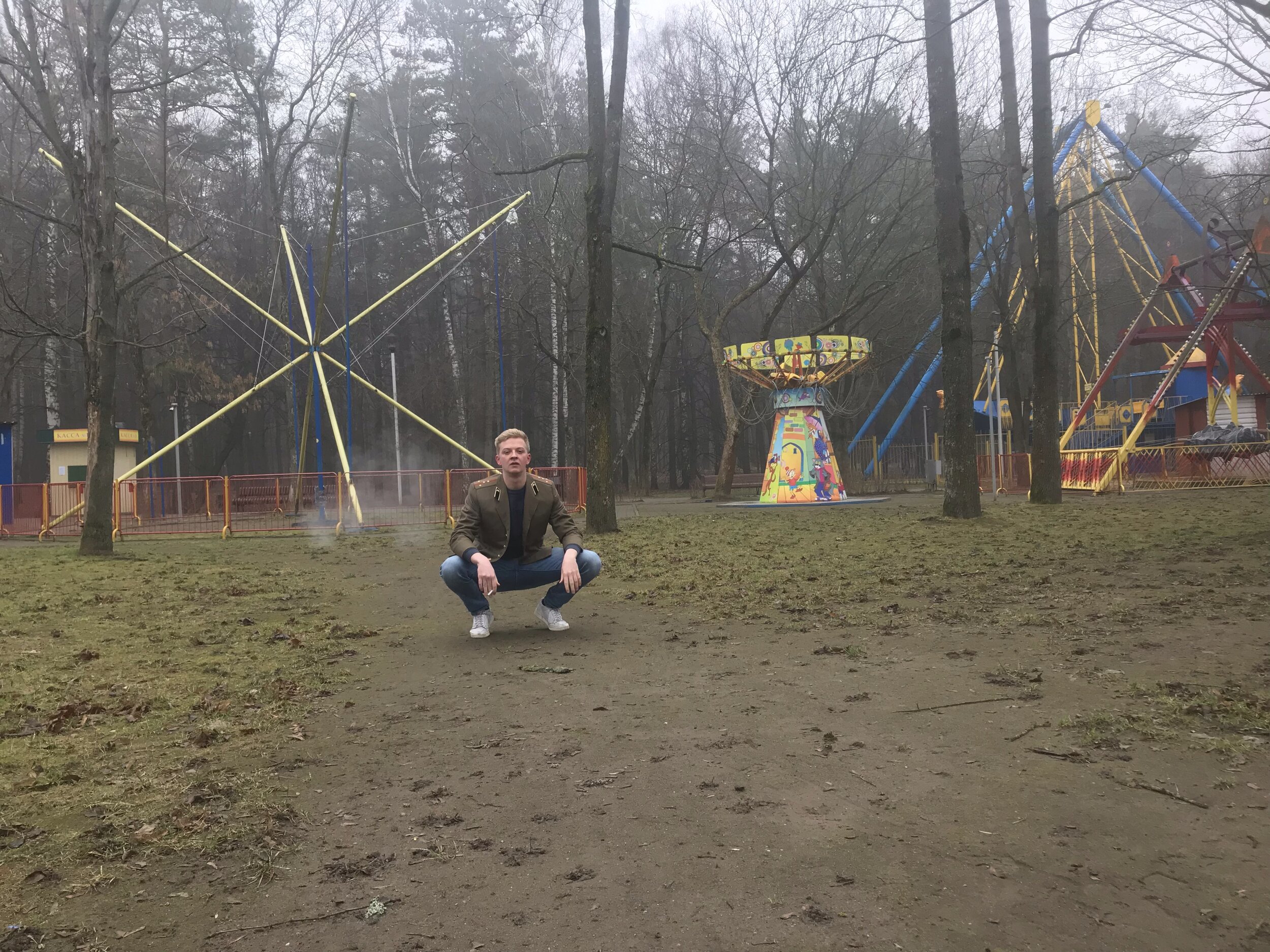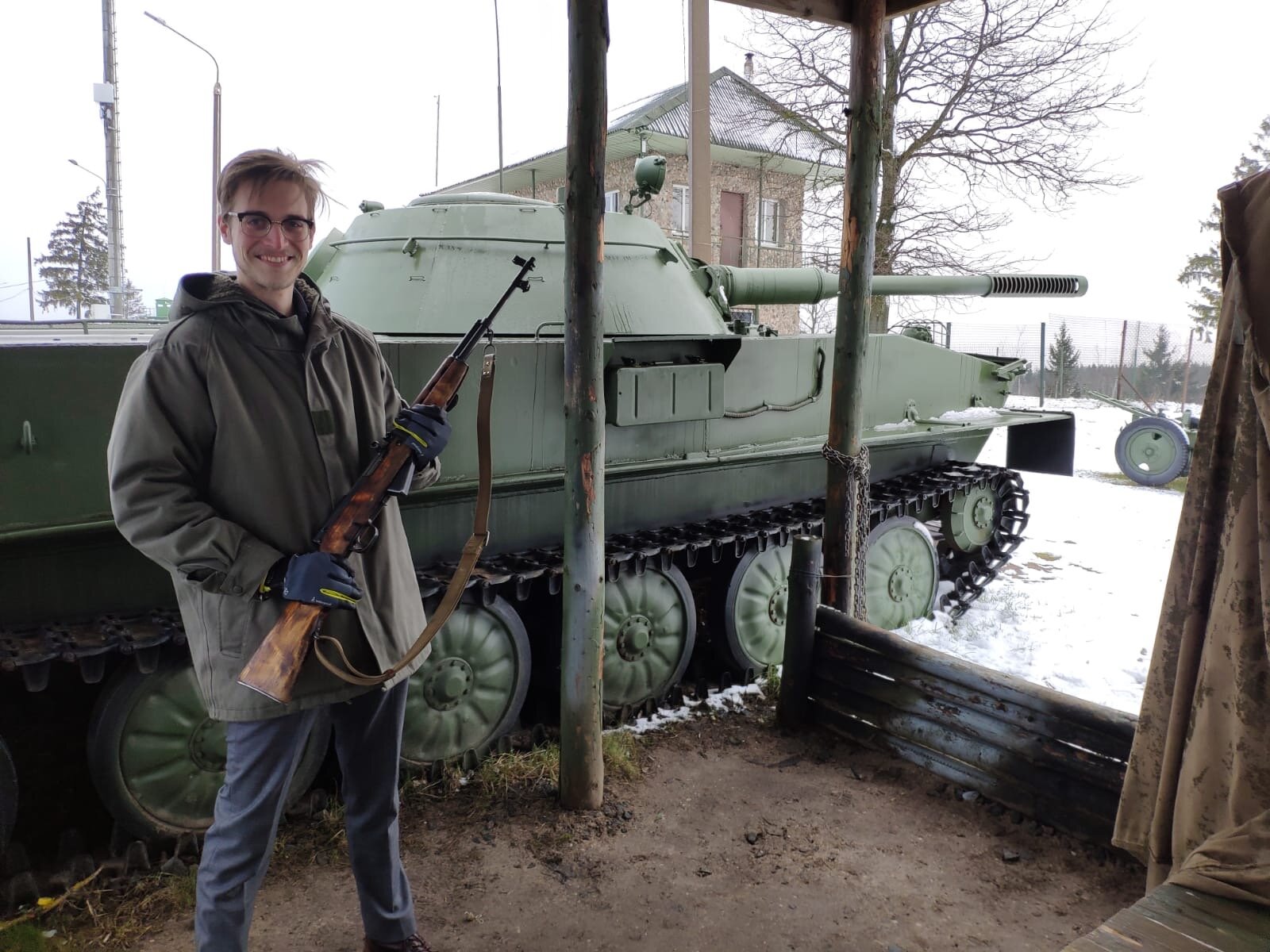A lot of people say that the Soviets perfected - or at least invented - the urban representation of depression and mediocrity. But I don’t know, I kind of love it. Like an environmental masochism, that architectural ‘fuck you’ formed so beautifully out of concrete and grit.
In January of 2020 I went to Belarus. Arguably one of the most forgotten - and forgettable - countries in Europe. I wanted to become an anonymous human in an anonymous country. There was no agenda, and hardly a will to see or do anything in the four days that I would be there. I wanted to be sad and invisible, letting the country form a backdrop to my midwinter sulking. Fortunately for my sanity, and unfortunately for my pretentious angsty idea of a hipster anti-holiday, my old friend Rico decided to join.
Rico is a person for whom moroseness and melancholy are as foreign as the landscape of Belarus. Rico does not know how to sulk, nor feel sorry for himself. Rico just, I don’t know, he exists with such little self awareness of the shining positivity he emits that its astounding. He says yes to things (like going to fucking Minsk in January), but he doesn’t congratulate himself for it. He smokes his cigarettes, provides great company, and keeps the train moving without asking for recognition or thanks. And I love him for that.
I leave Copenhagen for Vienna, where my flight connects to Belarus. At some forgotten gate, in some distant terminal, I find the board for Minsk. The waiting passengers are unmistakably Eastern European. The gate has what I can only describe as a phone booth for smokers, where the person is sealed inside, and some great contraption conveys the cigarette smoke up through the pipes and out the roof. There is a considerable line of black-leather-coat-wearing men waiting for the booth. These people, I suppose, are the first Belorussians I’ve ever seen. I try to draw conclusions from their dress and mannerisms.
I used to play the game in airports of looking at faces to try to guess where flights might be going. Back in Canada you could always tell when the flight was going to the North or to Quebec by the clothing. Here it is the leather coats and hats on the men, and the incongruous hair styles and makeup on the women. Not enough to be striking; but different nonetheless. dashes of blue on the eyeliner, or touches of hair dye that seem from a different age. I’ve seen those colours in some deep place in my past, maybe on the wall of the hair salon that my mother went to when I was a kid.
The plane gets spit out of the low clouds above the bare, rich soiled fields outside of Minsk. The sunlight that we had been enjoying for an hour, up above this featureless cloud layer is diminished, leaving only grey. The villages below are dull. The roads through them are unpaved and rutted. The potholes are visible even from this altitude. The cars parked on the streets and alleys are boxy and soviet. I wonder if its confirmation bias to observe that even they seem less colourful. The roofs on the village houses are grey. Uniformly so. And each has a little garden, with sodden brown piles of compost and dirt, and uneven fences surrounding. Apart from these scattered villages, the land is devoid of features. Not even hills. I love it.
Taxiing to the terminal, a huge monolith of concrete, we pass four ilyushin il-76 military transport planes. They are colossal. Cockpit windows matte blue with mist, they loom semi-visible in the January fog.
Rico meets me at the arrivals hall. As always he looks cheerfully out of place. For a start he is smiling, which is something I have yet to see from anyone here. He emits this carefree attitude, holding his head high and palms open. This subtle body language, I think, is such an open indicator of someone used to a free society that we don’t notice its non-universality. The Belorussians don’t smile. They speak quietly, and walk with eyes lowered and hands hidden. Or maybe they don’t. Maybe I am reading too much into it.
We take the metro into the city. The metro is the first sign in this country that the Soviet image may be outdated, but it is certainly not extinct. The enormous murals depicting impossibly handsome men, strong peasant women, and the power and pride of metropolis-like industry on the walls of the metro stations are not only undamaged, but they are so clean and intact that I suspect a certain reverence is paid to them. It seems, unlike the other Eastern Bloc countries, that they are in no hurry here to erase their recent history. These murals show us the first un-ironic contemporary hammer and sickles I’ve ever seen. The metro trains are equally antique, with deep blue exteriors and that sickening shade of Soviet turquoise green painted floor to ceiling inside the carriages. The men stand, while the women sit. Nobody is talking or making eye contact. Rico chats freely and animatedly, leaning close to be heard over the din of the half century old train.
The sun has gone down by the time we exit the metro. As we crest the steps we are greeted with the ‘Gates of Minsk’, an enormous symbol of Stalinistic city design, built by imprisoned German soldiers after the war. A monument. A symbol. A statement. A small story from the darkest time of human history. Built by slaves in a city that they themselves destroyed. At the bottom of the structure shines the golden arches of Mcdonalds. I don’t know what to make of that.
Belarus has a pretty rough past. Heavy in the air and in the minds of Belorussians is the ‘Great Patriotic War’ of 1941-1945. This Eastern front of the Second World War began at the German-Soviet border. The central thrust of the German invasion of the Soviet Union focused on the complete destruction of Belarus, and the capture of the strategic city of Minsk. why it was strategic I don’t know. Minsk capitulated in only two weeks, at a cost of nearly half a million Soviet soldiers. The commanders in charge of its defence were recalled to Moscow and summarily shot. This great battle for Minsk was only the beginning. What followed was almost exactly 3 years of occupation by the Nazis, who became increasingly harsh in response to partizan activities and sabotage. There were also partizans fighting for a free Belarus. These Belorussians wanted autonomy and independence from the Soviet Union. Stuck in this great web of conflicting allegiances and unmitigated violence were the peasants, who to a great extent just wanted to be left alone, and not take sides. They were pawns in an un-winnable game.
In 1944 the country was, at great cost, retaken by Soviet forces. Minsk was once again razed in battle, this time falling successfully back into Soviet hands. 80% of its buildings were reduced to rubble in the capture and recapture.
These years of war took the lives of nearly a third of all Belorussians. Nobody came out of the war unscathed. The German policy was to completely depopulate the lands to be ready for German migration. 9,200 settlements (villages and towns) were destroyed during the war. And I mean really destroyed. People included. The nearly 400,000 jews in pre-war Belarus were almost entirely exterminated.
The war left a deep scar.
After the war, The decision was taken to rebuild Minsk into a model Soviet industrial city. It was entirely and systematically rebuilt during the height of the Stalin era, at the Soviet’s proudest moment of triumph. Stalin wished to rebuild the city (and when I say rebuild I mean to say ‘force prisoners to rebuild’) to reflect this triumph. Minsk even gained the title of ‘Hero City’, a name it still bears in Russian to this day.
Minsk and its svislach river
Back in the present.
I love Botanical Gardens. I try to visit them in each new country or city. Rico is indifferent to them, but at least it was an activity. We set off to the big park in the northern part of Minsk to find the local garden. I figured that even in January they should have some hothouses giving some green to this blanket of mist. We wander through the park after another silent metro ride. It is one degree out and foggy. There are others in the park, talking quietly to each other in fur hats and leather coats. We find a group of people playing chess at a long table, looking like a scene from film noir. We ask in Russian if we can take a picture of the table. They wave their fingers and shake their heads, scowling. We don’t want to cause trouble so we keep walking. After an hour lost in the enormous park, we still haven’t found the greenhouses. I stop a woman walking with her elderly mother and ask in my broken Russian where we might find them. ‘Orangeria’ I call them, hoping they are familiar. The old woman begins talking to me in rapid unbroken lecturing Russian. I don’t understand anything. Her daughter looks apologetic. I let the woman lecture us, nodding and ‘hmm’ing at all the right moments, before resolutely thanking her for the help.
We never found the greenhouses.
Rico Posing In the park
On the metro back from the park, we are joined in the station by what seems like an entire company of soldiers, all wearing green soviet era fatigues and grey ushankas. they march back and forth on the platform and then wait in formation for the train. It is almost comical. A formation of soldiers riding the metro. I look at them warily. This is the army of a dictator, who has no pretence of being free and fair. Rico doesn’t worry about these kind of things. Anyone who knew him less might accuse him of being naive. I don’t think thats true; I think he has 27 years of dealing with people who are already defused by his innocent charm and optimism. If I were to walk up to the soldiers and ask for a selfie, I am sure I’d be greeted with, at best, a finger wave and head shake like at the park. But if Rico walked up to them, i’m sure he would be trading cigarettes, recalling old anecdotes, and taking selfies in their fur hats in no time.
It’s nighttime now in Minsk. We ice-skate at the local rink with the youths. Its the first happy place I have been thus far, with music and liveliness. I see teenagers on first dates, holding each other’s hands as they skate on trembling legs. It reminds me that love has to exist here too. I feel a bit stupid for forgetting.
We eat in an empty restaurant. In fact, nearly every restaurant we eat in during our trip is empty. The service and food is excellent. When we order in Russian, the young waiter notices our accents (shocking) and asks in english where we are from — followed after our answers with raised eyebrows and the question ‘Why are you here?’. He doesn’t ask it accusingly, and he cracks a huge smile when we respond with deadpan expressions that we are on holiday. Maybe he gets it.
Over dinner we decide our plan for the next day. I had set out to make a perfect anti-holiday by doing nothing whatsoever, but this does not comport with Rico. He wants to see things, no matter how dull. There are two options tomorrow. Firstly we drive to the Chernobyl exclusion zone and hike/sneak in to an abandoned village in the forest, possibly staying the night in the car. Or second, we drive to the ancient Belavutch forests in the far west of Belarus, where there are the last populations of wild European bison roaming through thousand year old oak trees. Rico has already been to Chernobyl, and I am a sucker for enchanted forests, so we decide on the bisons. Plus - who doesn’t love bison?
In the morning, we try to rent a log cabin deep in the forests of the park, but it is out of season. We try to rent a room in the Czar’s hunting lodge in a beautiful area of the forest, but it is out of season. The girl at the front desk of our Minsk hostel calls to the park for us and rents a room in a two star hotel in the nearest village. She says it is the only option.
Arriving at the grand entrance to the national park, after four hours of driving through bleak countryside, I fail to notice some peculiar aspects of the road; namely the heavy percentage of traffic which is made up of military personnel. We leave the car at a small lot next to the welcome and ticket centre. I ask for two tickets to enter. The girl at the counter takes a deep breath and looks as though she has gone through what is about to happen a thousand times. In Russian she tells me that actually, although its ‘technically’ a national park, its actually a military area, and therefore access is forbidden for tourists. I turn around and survey the gates. She has a point. There are Ural six-wheeled trucks full of soldiers driving in and out, and little UAZ jeeps parked in little rows in the parking lot. Just behind us, some sort of commander with a tall curved Russian hat is yelling into his phone. His attaché waits in the jeep parked just to the left, watching us uninterestedly. I turn back to the girl.
‘How do we go in then?’
‘Tour bus leaves at 10:00’
‘But its 17:00 now.’ She shrugs.
‘Tomorrow. 10:00.’
‘Can we do anything else?’
She points to the window between us, showing that for 4 rubles we can go on foot to see the bison. I buy the tickets. In the car again, under the pretence of collecting our cameras for the walk, Rico asks whats the worst that can happen. He puts the car in gear and we drive cautiously through the checkpoint/welcome gate. Alarms immediately sound. We are accosted over the loudspeaker by an unknown officer. The commander who was yelling into his phone by the welcome window steps calmly out into the road behind us - still talking into his phone - and lazily gestures us to reverse back to him. He guides us with hand signals back to our parking spot. I feel sheepish, like I’ve been caught stealing cookies.
‘It was worth a try.’
Inside the park there is a small outdoor zoo of fenced in animals. A bobcat, some birds, and for some reason an ostrich. A lone juvenile bison stands bored in the mud. Or I guess, I don’t know, can a bison be bored? He looks lonely.
the subject of our day-long excursion
‘Hotel #2’ The sign reads. They weren’t known for their creativity, those Soviets. We are the only guests.
We check in and register with the police (A rule which makes sure they can keep an eye on us). I wonder if the hotel is bugged. The woman at the hotel desk speaks Russian into google translate on her phone. We are informed about the rules and procedures by the google translate voice. The final sentence is played for us from the phone as she looks on curiously.
‘Why are you here?’
Rico and I head back into the park to eat at the only restaurant. Again we are the only diners. Russian pop music videos play through the wall-mounted tv, while waiters in white ties and dinner jackets bustle around us. Rico orders the bison stew. A local speciality.
Back at the hotel we open the bottle of vodka we had bought in Minsk and take a stroll through the village. Its not so bad here, I think to myself. The houses are kind of cute.
We walk on.
I change my mind. The depression of living here overwhelms me. I can’t fathom it.
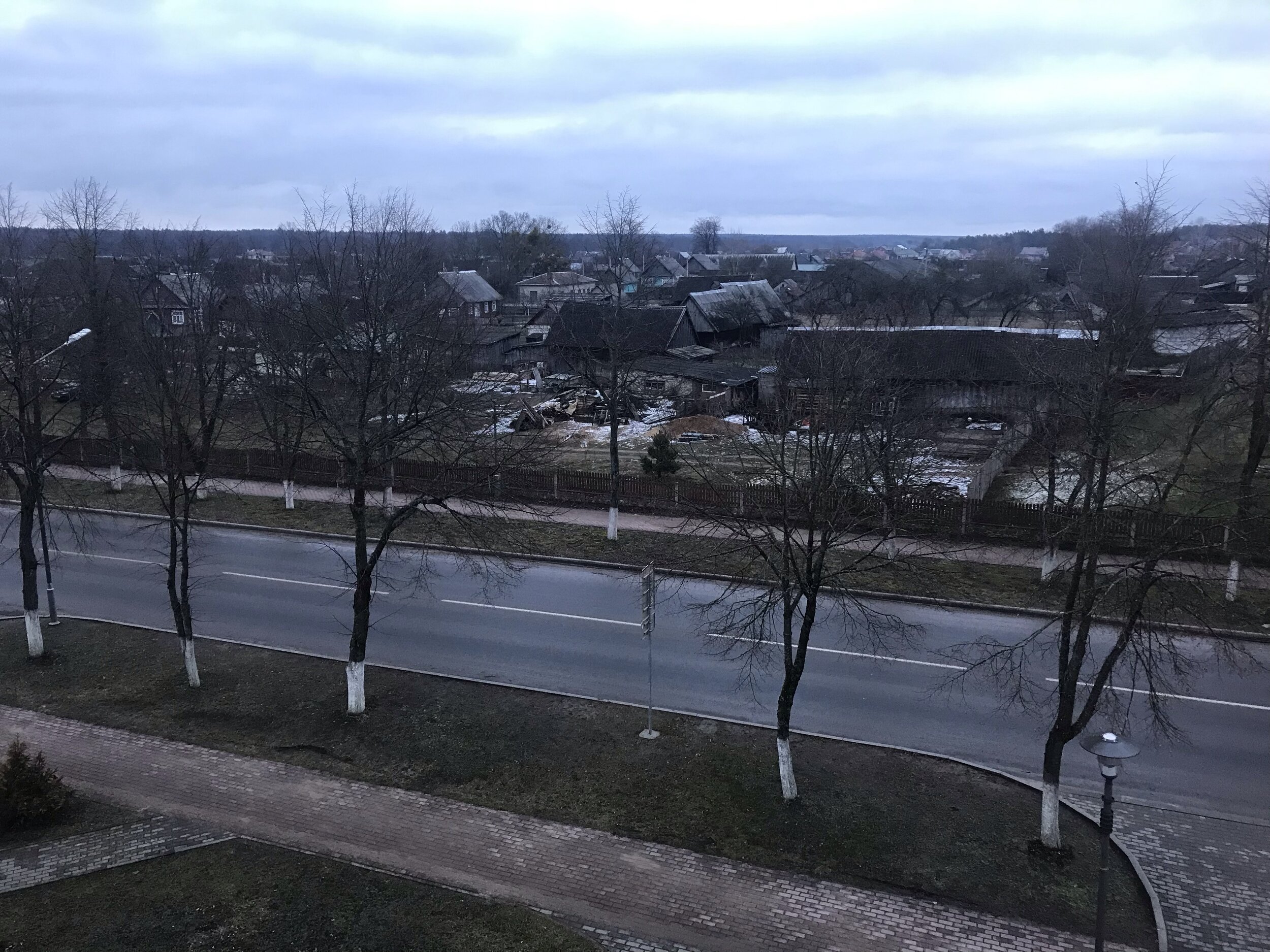
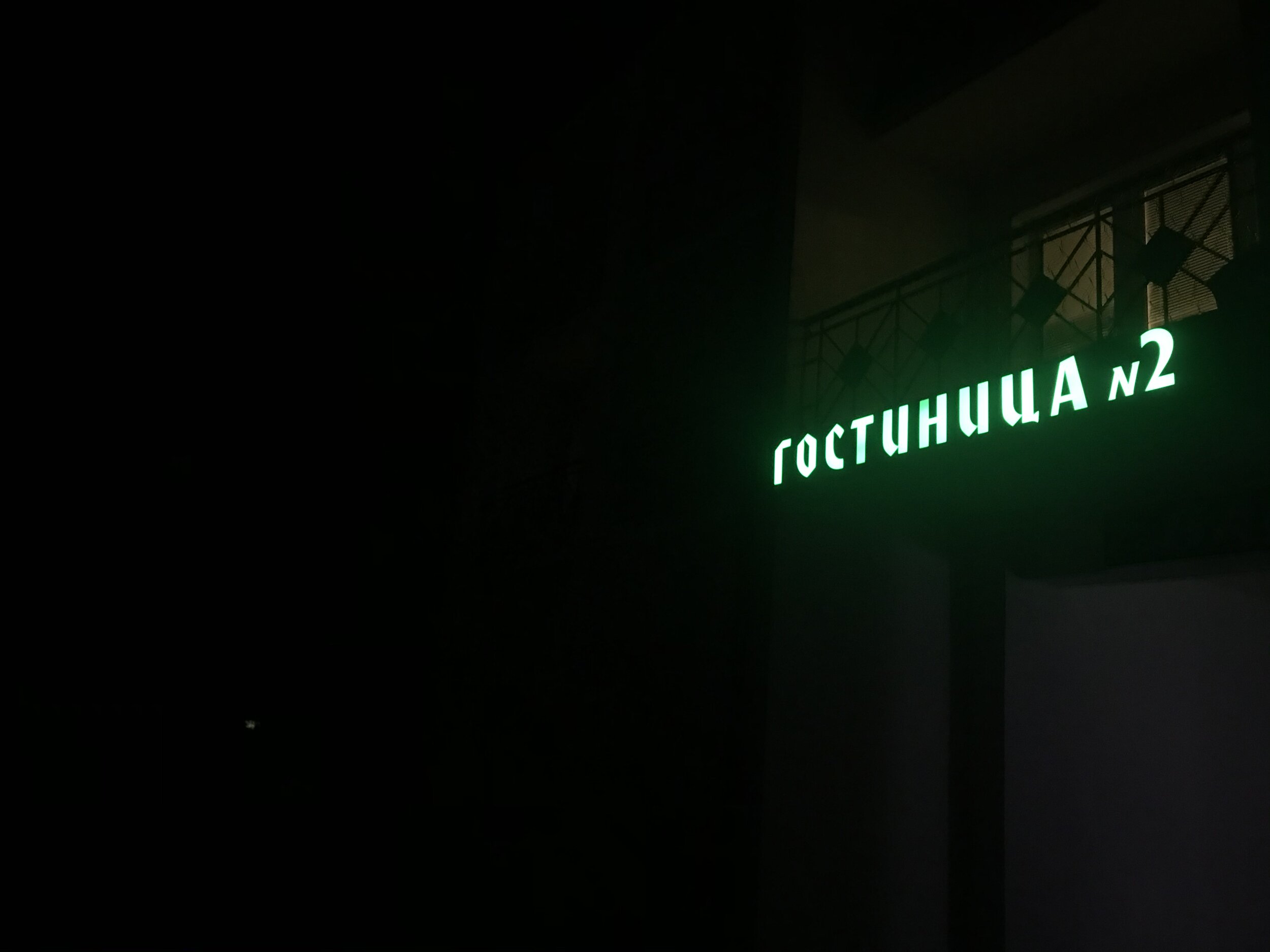
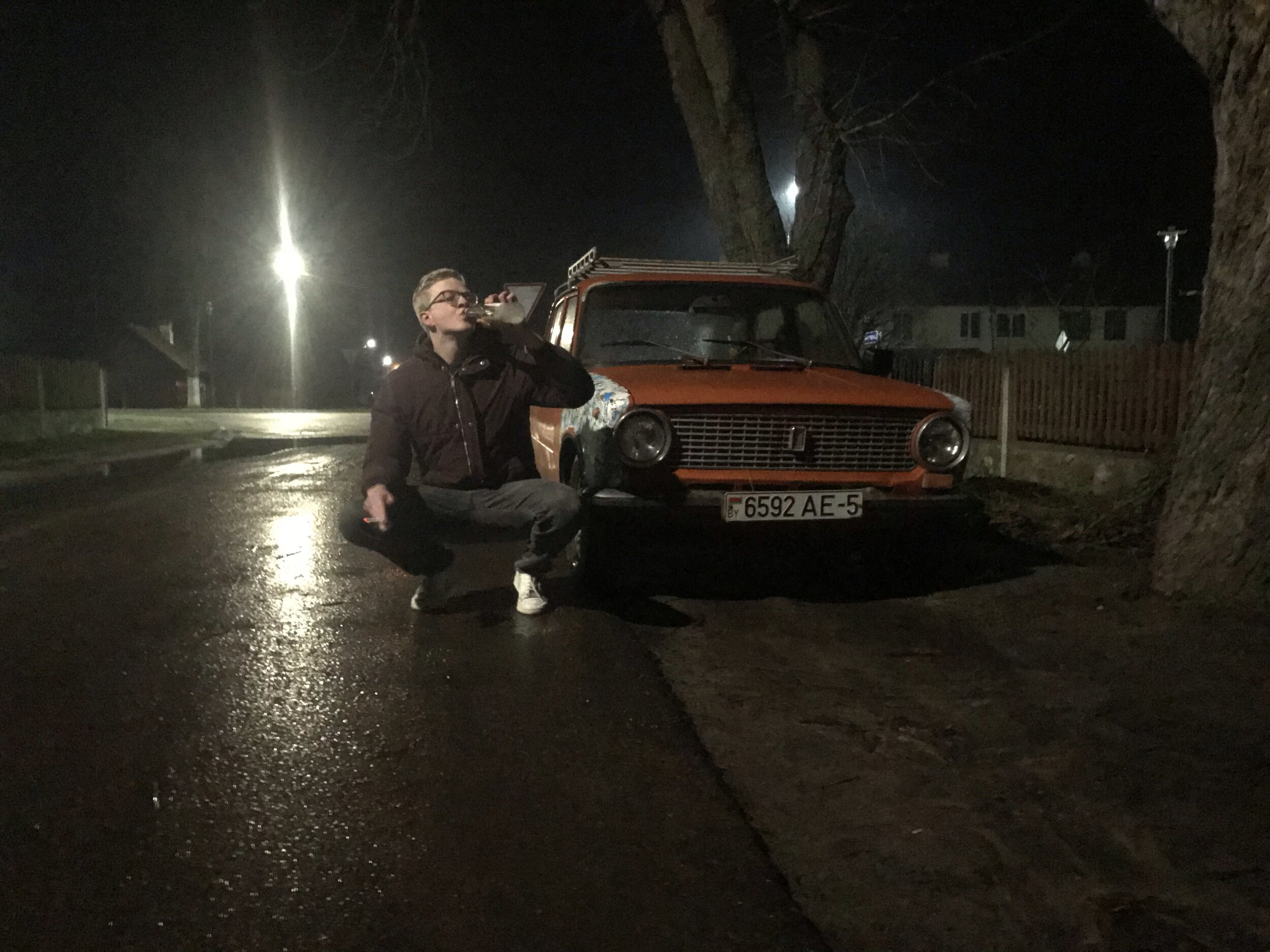
We leave back to Minsk in the morning.
At the orthodox church in a city called Slonim, a woman gives us an in depth tour of seemingly every icon and candle. She wears a full length sable fur coat, with a sable fur hat. Neither Rico nor I understand her, but we nod and smile while she gestures at this or that.
The police in Slonim drive Ladas.
After 20 minutes being in the city, We try and fail to find anything more to see or do. There is a T-34 tank mounted on a plinth in the city centre, which I tell myself was worth a detour to see. On the way out of the city we pass a group of soldiers working to fix their Ural truck. A dozen of them stand around smoking cigarettes, while two sit up in the engine bay. We stop and ask if we can take a picture. Waving fingers and shaking heads. The man who appears to be supervising the repairs gestures at us to keep moving. Oh well.
I feel uneasy here, like we are being watched. Rico doesn’t.
After Slonim we stop at an outdoor museum of Soviet military weapons and vehicles. For the first time on the trip we are not alone as tourists here. We meet two Lithuanians also wandering around the bleak landscape of the museum. Snow falls slowly on the Mig fighter jets and T-72 tanks. Its wet and cold. A man dressed in military fatigues steps out of a little camper-trailer along the path and proposes that for 10 rubles we can shoot an AK-47. Im not sure if his costume is really a costume or just the warmest jacket he could find. We both shoot the AK. Now I wonder about going through security tomorrow with gunpowder residue all over my jacket. That hopeless bleakness all around us makes me giddy, and I pull Rico around the vast museum like a child, posing for photos in front of the tanks and ballistic missiles.
In Minsk we decide to cap off the trip with a fancy restaurant and a few cocktails. Surprisingly we are far from alone at the restaurant, which is a cozy little place situated on Karl Marx street. It is ‘romantically’ lit, and as we sit down, a well-dressed man at the table next to us pulls out a box of matches and lights the candles on our table for us. We thank him and he nods deeply and returns to his seat. Damn I wish I could be smooth like that. Is that a Belorussian thing? Or just being a gentleman? Where did he learn that move? I guess its like the men who stand up on the metro, saving the seats for the women.
The waitstaff don’t speak english. We are not surprised, as its been more or less like this for the whole trip. Its quite fun, and we amuse ourselves by taking turns practicing our Russian with the waiters. They are professional to a fault, and never make light of our attempts, even when we laugh at each other. It is a wonderful game.
We treat ourselves; ordering aperitifs, appetizers, main courses, desserts, coffees, and digestifs (we are recommended vodka). The appetizer is a bowl of borsht with a scoop of sour cream on top, which carries such stereotypical Sovietness that I almost laugh when I see it; but then again, have you ever had good borsht? Its incredible. The rest of the meal is equal to the borsht, and by the time we finish some hours later, we are in such incurably good moods that we aren’t quite ready to head home.
At the corner of Karl Marx and Lenin streets (I’m serious.) A door of a flight of steps swings violently open and a young man steps out, still looking over his shoulder back into the darkness, yelling his final goodbye. We stop quickly to avoid colliding with him. There is gayety and music emanating from the bottom of the stairs. We pause; shrug and enter through the unmarked door, buoyed by full stomachs and Rico’s confidence and curiosity. At the bottom of the steps we pass a bit timidly into a subterranean hookah lounge. The haze makes it hard to make out the people and decorations. We sit on pillows, watching these young Belorussians with their tattoos and computers. Its the first outward indication that the people here realize and acknowledge the world outside their borders; outside their stubborn hermit kingdom, where the cold war is still being fought in every living room and metro station.
We wander back to our hostel along Nezhaleznosti Prospekt, the enormous boulevard designed for tanks that runs through the centre of Minsk from one end to the other. Here we are back in that cold war world again. It must be the widest street I’ve ever seen. I’ve driven on American freeways that are smaller than this. In front of the concrete government building in Independence square stands an enormous statue of Lenin, with fresh red flowers laid at his feet.
What an absurd place. An absurd city. An absurd country. An anachronism in the 21st century. I’ve never seen anything like it. Its mesmerizing.
Two weeks later I get a message from Rico. He has received a speeding ticket from the police department of Slonim. 72 in a 60 zone. The letter finishes with the warning:
‘Failure to pay this fine will result in an immediate lifetime ban from the Republic of Belarus, or imprisonment in the case of return’
We decide not to pay it. After all, we never did visit a Belorussian prison. Maybe they could use some of Rico’s cheerfulness.




